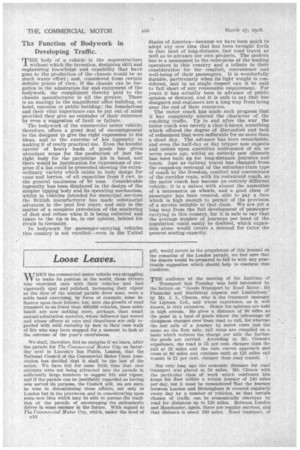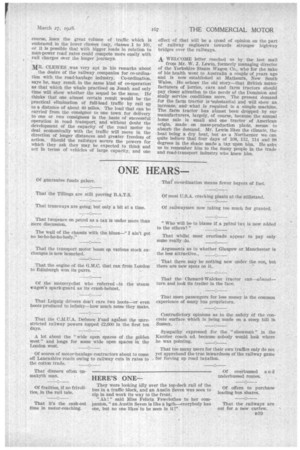Loose Leaves.
Page 80

Page 81

If you've noticed an error in this article please click here to report it so we can fix it.
ATEIEN the commercial motor vehicle was struggling to make its position in the world, those drivers who exercised care with their vehicles and had vigorously spat and polished, increasing their vigour as the date of the annual parade drew near, were a noble band exercising, by force of example, some influence upon their fellows, but, with they growth of road transport to no fewer than 40.0,000 vehicles, these noble bands are now nothing more, perhaps, than small mutual-admiration societies, whose influence has waned and whose efforts at care and cleanliness are only regarded with mild curiosity by men in their own -walk of life who may have stopped for a moment to look at the outcome of the year's carefulness.
We shall, therefore, feel no surprise if we learn, after the parade for The Commercial Motor Cup on Saturday next in Lincoln's Inn Fields, London, that the National Council of the Commercial Motor Users Association has decided that it shall be the last of the series. We have felt for some little time that new entrants were not being attracted into the parade in sufficiently large numbers to suggest life and vigour, and If the parade can be justifiably regarded as having now served its purpose, the Council will, we are sure, be wise in discontinuing these affairs, not only in London but in the provinces, and in concentrating upon some new idea which may be able to pursue the tradition of the parade of encouraging the enthusiastic driver in some manner in the future. With regard to The Commercial Motor Cup, which, under the deed of
n1 g gift, would revert to the proprietors of this journal on the cessation of the London parade, we feel sure that the donors would be prepared to fall in with any practicable suggestion which should help to cantinue that tradition.
THE audience at the meeting of the Institute of
Transport last Tuesday was held interested by the lecture on "Goods Transport by Road Motor : Its Financial and Statistical Aspects and Limitations," by Mr. J. L. Clewes, who is the transport manager for Liptons, Ltd., and whose experience, as is well known, is very extensive. Hence his opinions are held in high esteem. He gives a distance of 80 miles as the point in a haul of goods where the 'advantage of cheapness changes over from road to rail, for whereas the last mile of a journey by motor costs just the same as the first mile, rail rates are compiled on a basis which reduces the charge per mile the farther the goods are carried. According to Mr. Clewes-'s experience, the road is 55 per cent. cheaper than the rail at 20 miles and the rate curves approach and cross at 80 miles and continue until at 123 miles rail transit is 21 per cent. cheaper than road transit.
Not very long ago the economic distance for road transport was placed at 50 miles. Mr. Clewes with the particular class of work which confronts him keeps his fleet within a return journey of 140 miles per day, but it must be remembered that the journey between London and Birmingham is covered regularly every day by a number of vehicles, so that certain classes of traffic can be economically conveyed by road for distances up to 120 miles. Between London and Manchester, again, there are regular services, and that distance is about 180 miles. Road transport, of course, loses the great volume of traffic which is embraced in the lower classes (say, classes 1 to 10), or it is possible that with bigger, loads in relation to man-power road' rates could compete more easily with rail charges over the longer journeys.
MR. CLEWES was very apt in his remarks about the desire of the railway companies for co-ordination with the road-haulage industry. Co-ordination, says he, may result in the same kind of co-operation as that which the whale practised on Jonah and only time will show whether the sequel be the same.'
thinks thinks that one almost certain result would be the practical elimination of full-load traffic by rail up to a distance of about 40 miles. The load that can be carried from the consignor to one town for delivery to one or two consignees is the basis of successful operation in road transport, and without doubt the development of the capacity of the road motor to deal economically with the traffic will move in the direction of longer distances and greater freedom of action. Should the railWays secure the powers for which they ask they may be expected to think and act in terms of vehicles of large capacity, and one effect of that will be a trend of opinion on the part of railway engineers towards stronger highway bridges over the railways.
A WELCOME letter reached us by the last mail from Mr. W. J. Lewin, formerly managing director of the 'Yorkshire Steam Wagon Co., who for the sake of his health went to Australia a couple of years ago and is now established at Mathoura, New South Wales. He echoes the old story—that British manufacturers of lorries, cars and farm tractors should pay closer attention to the needs of the Dominion and study service conditions more. The present demand for the farm tractor is •substantial and will show an increase, and what is required is a simple machine. The farm tractor has almost been dropped by our manufacturers, largely, of course, because the annual home sale is small and one tractor of American origin, made on mass-production plans, :seems to absorb the demand. Mr. Lewin likes the climate, the heat being a dry heat, but as a Northerner we can quite believe that four days of 108, 112, 114 and 98 degrees in the shade made a tax upon him. He asks us to remember him to the many people in the trade and road-transport industry who knew him.




























































































































































































